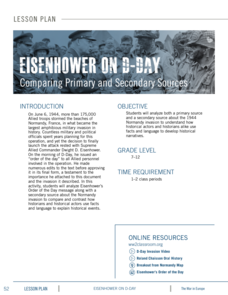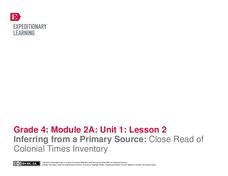Historic New Orleans Collection
Exploring Primary Sources: Music in New Orleans
Looking for a new and exciting way to teach young historians the art of primary source analysis? Jazz up your instructional activity with a resource that asks class members to analyze photos, travel documents, and letters written by some...
Humanities Texas
Primary Source Worksheet: “Report on Manufacturers,” Annals of Congress
Invite your learners to take a look at life during the term of United States president George Washington through analysis of an interesting primary source. The document summarizes American manufacturing capacities, as detailed...
PBS
Using Primary Sources: The Rogue's Gallery
What would be in your life's scrapbook? Scholars use short video clips, primary and secondary documents, and photos to investigate a 1909 scrapbook. They analyze and uncover what the Rogue Book tells them about the past in Western...
Humanities Texas
Primary Source Worksheet: Abraham Lincoln, Draft of the Gettysburg Address
Young historians closely examine the words of Abraham Lincoln's Gettysburg Address with this primary source analysis activity.
National WWII Museum
Eisenhower on D-Day: Comparing Primary and Secondary Sources
Dwight D. Eisenhower's message to troops for D-Day is iconic. Individuals examine Eisenhower's words and compare that to historians' understanding of the epic events of that day using primary sources, an essay, and a Venn diagram to...
PBS
Primary Source Set: Little Women by Louisa May Alcott
What did Jo write her stories with? How did the March sisters dress? A primary source set designed for Louisa May Alcott's Little Women prompts learners to look over images of household items and clothes from the 1860s before...
Briscoe Center for American History
Identifying Primary Source Documents
Who is Mary Maverick and why is she important? the focus of this, the second in a series of five lessons that are designed to introduce middle schoolers to how historians use primary source documents to understand the past, is on...
Curated OER
Using Primary Source Documents
Students examine copies of primary source documents and determine the document's value to a researcher. They analyze and evaluate the document for bias or contradiction. They know the difference between a primary and secondary source.
Curated OER
Reading Primary Source Documents: Comparing Sources
Students analyze and compare various primary source documents. They formulate historical questions based on the documents.
Curated OER
Primary Source Analysis Worksheet
In this Colonial America primary source analysis worksheet, reviewers respond to 5 short answer questions. Although the primary source documents are not included, the questions could be adapted to the analysis of any primary source.
Curated OER
Using Primary Sources: Letters from the Presidents
Students find out about the minds and thoughts of presidents through reading their actual letters. They explore the personal lives of presidents. They answer questions about a primary source. They write essays.
Roy Rosenzweig Center for History and New Media
Early English Settlements History Detectives
Young historians play the role of history detectives as they investigate some primary source texts and images related to the early colonization of America, The Jamestown Settlement, and the Mayflower Compact.
Roy Rosenzweig Center for History and New Media
Continental Differences
Students break into groups and closely investigate primary sources associated with the seven different continents. After deciding which continent their primary sources relate to, representatives from each group present their...
Brown University
Analyzing the News
With so many ways to follow the news today, it is imperative to think critically about the sources of information we are turning to. Here is a fantastic graphic organizer that will help your learners develop the skills to...
Curated OER
Understanding and Using Primary and Secondary Sources in History
Explore primary and secondary sources in this historical analysis lesson. Young researchers define the terms primary source and secondary source. They read a primary source document provided by the teacher and answer questions about...
PBS
Using Primary Sources: Nazi Spy Ring Busted
Spy games are not just for professionals anymore! Scholars use short video clips, primary documents, and photographs to investigate Nazi spies in America during World War II. The young detectives analyze the paranoia warfare can...
Curated OER
Applying KWL Guides to Sources with Elementary Students
What is a KWL chart? Here is a well thought-out lesson that has learners use KWL charts to gain historical perspective. Your class examines primary sources about historical events and identifies what they know, want to know, and,...
Center for History Education
Was the Stamp Act Fair?
Pledge your loyalty to the king and the Stamp Act or sign an oath against the tax. After simulating an in-class tax for school supplies, young historians consider the reasons for the Stamp Act and similar colonial policies. The...
EngageNY
Inferring from a Primary Source: Close Read of Colonial Times Inventory
Teach your class about colonial America through an examination of primary documents. First though, start vocabulary notebooks for content-specific and academic vocabulary. Pupils can keep this record during the entire module. Once this...
Thomas Jefferson Foundation
Personal Morals vs. Political Moves Document Based Essay
Was Thomas Jefferson a hypocrite? Tackle this question with primary source analysis and an essay. The packet includes historical background, a writing prompt, a combined outline and checklist, and ten primary documents paired with...
Center for Civic Education
The Power of Nonviolence: What Is Nonviolence? What Does It Cost?
Your young learners will delve into the language of primary source documents in order to identify the characteristics, benefits, and costs of nonviolence. The lesson includes a mix of activities, including an anticipatory activity,...
Humanities Texas
Primary Source Worksheet: Thomas Jefferson, Message to Congress Concerning Louisiana
Proficient reading of informational text, especially primary source documents, requires practice. This message from Thomas Jefferson about the Louisiana Purchase offers readers a chance to develop these comprehension skills.
Digital Public Library of America
Teaching Guide: Exploring Little Women
Louisa May Alcott's Little Women is a literary masterpiece as well as a timestamp of the formative mid-nineteenth century in America. Using a primary source set of photographs, letters, and portraits, readers discuss the ways...
Curated OER
Tintin and I: Primary and Secondary Sources
Mickey Mouse, Elmo, and Tintin? Belgian cartoonist Georges (Herge) Remi’s famous comic character launches a study of primary and secondary source material and the impact these sources have on storytelling. Class members also examine the...
Other popular searches
- Using Primary Sources
- Wwi, Primary Sources
- Rosa Parks Primary Documents
- Gilded Age Primary Sources
- Working With Primary Sources
- Primary Resources Hsie
- Web Quests Primary Sources
- Ancient Rome Primary Sources
- 1920 1929 Primary Sources
- Primary Sources and Family
- Conscription Primary Sources
- Scotland Primary Sources

























